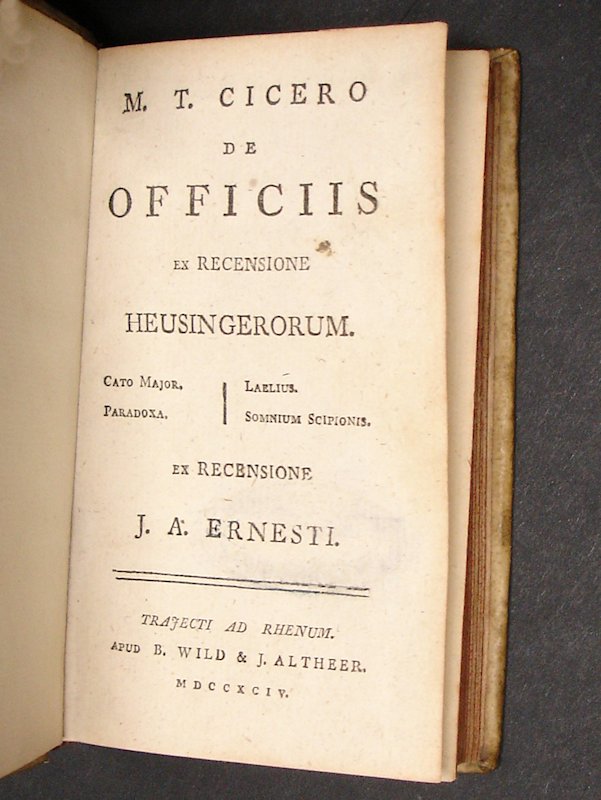CICERO.
M.T. Ciceronis De officiis, ex recensione Heusingerorum. Cato major, Laelius, Paradoxa, Somnium Scipionis, ex recensione J.A. Ernesti.
Utrecht (Trajecti ad Rhenum), Apud B. Wild & J. Altheer, 1794.
12mo. (II),288 p. Vellum 13.5 cm (
Ref: Schweiger 2,205; cf. Dibdin 1,415; cf. Moss 1,309) (
Details: 2 thongs laced through the joints. Edges dyed red. Label with woodcut coat of arms of Rotterdam, measuring 3,5 x 4,5 cm, on the front pastedown. Latin text of Cicero only, no preface, notes, translation or commentary) (
Condition: Vellum a bit rubbed and soiled) (
Note: This collection of philosophical works of the Roman politician and orator Marcus Tullius Cicero, 106-43 BC, the De Officiis, Cato Major, Laelius, Paradoxa and the Somnium must have seen, ever since it first appeared in 1469, hundreds of editions. Of these five texts the first one, on the Offices, was the most important and the most popular. The editio princeps of the Offices was published in 1465. The excellent Heusingerii-edition of the Offices dates from 1783, 'without which no critical student can fully comprehend this treatise of Cicero. It may be called the joint production of Grandfather, Father and Son (Heusingeri). (...) I give this edition a ready and hearty recommendation to every classical collector'. (Dibdin) The German 'Schulmann' and local historian Johann Michael Heusinger, 1690-1751, was rector of several Gymnasia, in Laubach, from 1730 in Gotha and from 1738 in Eisenach. His edition of Cicero of the Offices has 'noch jetzt ihre Brauchbarkeit nicht eingebüßt. Als guter Beobachter des Sprachgebrauchs hat er im Lateinischen mehrere Sprachgesetze ausgestellt, die sich als richtig bewährt haben; als Kritiker war er besonnen, so daß ihm manche sichere Verbesserung verderbter Stellen verdankt wird'. (ADB 12, 334/335) His son, Jakob Friedrich Heusinger, 1719-1778, was also a 'Gymnasialrektor'. Johann Michael collated for the text several manuscripts and consulted late antique sources, his son consulted five more manuscripts from Wolfenbüttel, and used ancient grammarians and earlier editions. 'Der erste beschäftigte sich vorzürglich mit der Erläuterungen, Jakob Friedrich mehr mit der Critik'. (Hoffmann) However both men died before the edition was finished. The son of Jakob Friedrich, Konrad Heusinger, 1752-1820, finally edited the work of both his father and grandfather, wrote an introduction, produced an index, and published it in 1783 in Braunschweig. Konrad was also a 'Schulmann', and classical scholar. He succeeded his father at the Gymnasium of Wolfenbüttel. (ADB 12,336/37) The four remaining texts of Cicero in this collection were adopted from the third edition (1774/77) of the Opera Omnia edition of the German classical philologist and theologian Johann August Ernesti, 1707-1781. This collection on 1794 is a school text. It offers the Latin text of Cicero's treatises only, no preface, notes, translation or commentary) (
Provenance: The label with the woodcut coat of arms of Rotterdam is perhaps an indication that the book was a small gift of the City Council) (
Collation: pi1, A-M12 ) (Photographs on request)
Book number: 120010 Euro 100.00
Keywords: (Oude Druk), (Rare Books), Cato Maior, Cicero, Ernesti, Laelius, Latin literature, Paradoxa, Roman philosophy, Somnium Scipionis, antike altertum antiquity, de officiis, römische Literatur, römische Philosophie
 CICERO.
CICERO.